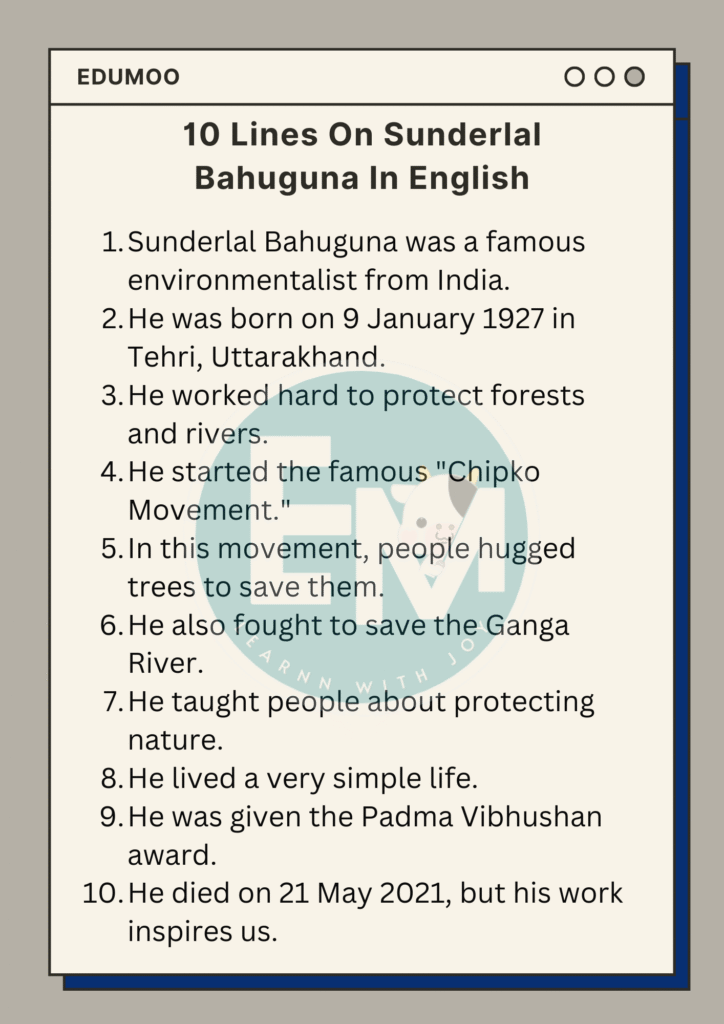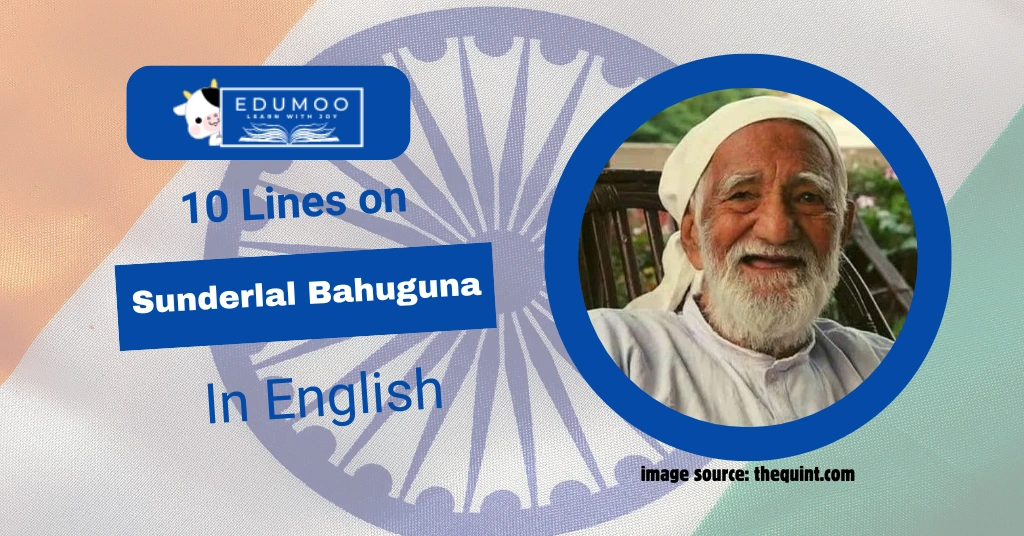Sunderlal Bahuguna was a great man who loved and protected nature. He believed that trees, rivers, and mountains are our real wealth, and we must take care of them. He is best known for the famous Chipko Movement, where people hugged trees to stop them from being cut down. Sunderlal Bahuguna also worked to save the Ganga River and always inspired people to live close to nature. His life teaches us to respect our environment. In this blog, we will read 10 lines on Sunderlal Bahuguna to understand his life and work.
10 Lines On Sunderlal Bahuguna In English
- Sunderlal Bahuguna was a famous environmentalist from India.
- He was born on 9 January 1927 in Tehri, Uttarakhand.
- He worked hard to protect forests and rivers.
- He started the famous “Chipko Movement.”
- In this movement, people hugged trees to save them.
- He also fought to save the Ganga River.
- He taught people about protecting nature.
- He lived a very simple life.
- He was given the Padma Vibhushan award.
- He died on 21 May 2021, but his work inspires us.

Essay On Sunderlal Bahuguna In English In 250 Words
Sunderlal Bahuguna was a great environmentalist from India who worked all his life to save nature. He was born on 9 January 1927 in a village in Tehri, Uttarakhand. From a young age, he was influenced by Mahatma Gandhi’s thoughts and believed in living a simple life.
One of his most important contributions was the famous Chipko Movement. In this movement, people hugged trees to prevent them from being cut down. This simple but powerful step made the whole world notice the importance of forests. Sunderlal Bahuguna strongly believed that trees are like our protectors because they give us oxygen, prevent soil erosion, and bring rain.
Apart from protecting trees, he also worked to save rivers. He fought to protect the Ganga River from pollution and large dams. He believed that if rivers are not kept clean, people and animals will suffer. He even went on long hunger strikes to make the government listen to his demands.
Sunderlal Bahuguna lived a very simple life and inspired thousands of people to care for nature. He never cared about comfort and dedicated himself fully to saving the environment. His message was clear: “Ecology is permanent economy,” meaning that if we take care of nature, it will take care of us.
Because of his great work, he was honored with many awards, including the Padma Vibhushan, one of India’s highest civilian awards.
Sunderlal Bahuguna passed away on 21 May 2021, but his work continues to inspire us even today. His life teaches us that we should protect trees, rivers, and mountains for future generations. He will always be remembered as a true hero of the environment.
Essay On Sunderlal Bahuguna In English In 850 Words
Sunderlal Bahuguna was a great environmentalist and social worker from India. He dedicated his entire life to protecting forests, rivers, and the natural balance of our environment. He is best remembered for the Chipko Movement, where people hugged trees to prevent them from being cut down. His love for nature and his courage to fight for it made him a true hero of the environment.
He was born on 9 January 1927 in a small village called Maroda in Tehri, Uttarakhand. His childhood was spent in the lap of the Himalayas, surrounded by forests, mountains, and rivers. Growing up in such a beautiful natural place deeply influenced him. From a young age, he understood the importance of trees and rivers in people’s lives. He was also inspired by Mahatma Gandhi’s teachings and decided to live a life of simplicity, truth, and non-violence.
Sunderlal Bahuguna lived in a very simple way. He wore khadi clothes, ate plain food, and mostly traveled on foot. He believed that people should not misuse or waste the resources of nature. His life itself was a message to others—live simply and respect nature. He always said that real happiness does not come from wealth but from living close to the environment.
The most famous contribution of Sunderlal Bahuguna was the Chipko Movement. During the 1970s, large numbers of trees were being cut in Uttarakhand for commercial use. The villagers, especially women, realized that cutting down trees would cause floods, soil erosion, and shortage of water. Under Bahuguna’s guidance, the people decided to protest peacefully. They hugged the trees to stop the woodcutters from cutting them down. This unique way of protest was called “Chipko,” which means “to hug” or “to cling.” The movement became world famous and taught everyone that common people, with unity and courage, can protect nature.
Apart from saving trees, Sunderlal Bahuguna also worked for rivers. He was deeply concerned about the Ganga River. He believed that dams, pollution, and human carelessness were harming the river. He strongly opposed the Tehri Dam project in Uttarakhand because he thought it would destroy forests, villages, and the balance of nature. To protest against this, he went on long hunger strikes. His aim was to make the government and people realize that destroying rivers would harm both humans and animals. He always said that clean rivers are as important for life as clean air.
One of the most important messages of Sunderlal Bahuguna was “Ecology is permanent economy.” By this he meant that protecting nature is more valuable than temporary financial profit. If we destroy forests and rivers for short-term money, in the future we will face big problems like floods, droughts, and climate change. Forests give us oxygen, bring rain, and stop soil erosion. Rivers provide water for drinking and farming. Mountains give us herbs and resources. If we destroy them, we destroy our own lives. He believed that true wealth is not money but nature itself.
His work and sacrifice were recognized both in India and abroad. He received several awards for his efforts. In 1981, he was given the Jamnalal Bajaj Award. In 1986, he received the Right Livelihood Award, also known as the Alternative Nobel Prize. Later, in 2009, the Government of India honored him with the Padma Vibhushan, one of the country’s highest civilian awards. These awards showed how much his work was respected around the world.
Even in his old age, Sunderlal Bahuguna continued to spread awareness about the environment. He traveled to many places to inspire people to save trees, rivers, and mountains. He lived every day of his life with the same dedication and courage. On 21 May 2021, he passed away at the age of 94. His death was a great loss for the country, but his teachings and thoughts are still alive and continue to guide people.
The life of Sunderlal Bahuguna teaches us many valuable lessons. He proved that even one person’s strong will can inspire thousands of others. He also showed that non-violence and peaceful protest can bring big changes. His life teaches us to value simple living and to understand that protecting nature is more important than running after money. In today’s world, where pollution, deforestation, and climate change are big problems, his thoughts are more important than ever.
In conclusion, Sunderlal Bahuguna was not just an environmentalist but also a true guardian of nature. The Chipko Movement and his fight for the Ganga River are shining examples of his dedication. His slogan “Ecology is permanent economy” will always remind us that without nature, there can be no life. Even though he is no longer with us, his spirit continues to live in every tree, every river, and every mountain he fought to save. It is now our responsibility to follow his path and protect the environment for future generations. Sunderlal Bahuguna will always be remembered as a hero who loved nature and showed the world how to live in harmony with it.
Conclusion
Today, we have learnt 10 lines on Sunderlal Bahuguna. Sunderlal Bahuguna’s life is a true example of love for nature. He showed us that even one person’s effort can save the environment. Through the Chipko Movement and his fight for the Ganga River, he made people realize the importance of trees and clean water. His work teaches us to live in harmony with nature and respect our surroundings. Even though he is no longer with us, his thoughts and efforts continue to inspire. We should always remember him and try to protect the environment just like he did.

